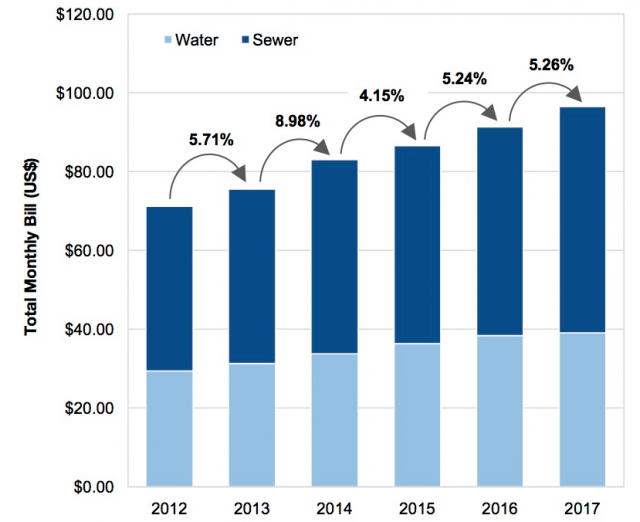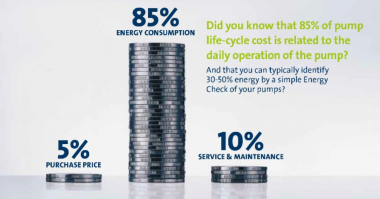Residential water and wastewater bills have steadily increased by 5.7% annually over the past five years, outpacing average annual income growth (5%) and inflation (1.9%) and magnifying the financial challenges facing municipal water utilities. Analysis of the 50 largest metropolitan areas in the U.S. show combined monthly water and wastewater bills averaging US$91.06, based on standard household consumption by geography, according to a new U.S. Municipal Water and Wastewater Utility Bill Index from Bluefield Research.
With so much focus on water, the impact of sewer charges on household budgets is often overlooked. In 2017, wastewater represented 58% of the total average utility bill for U.S. households. However, the disparity across cities is extreme, with monthly sewer bills ranging from $14.04 in Memphis to a high of $135.57 in Seattle. Similarly, monthly water bills for customers in Memphis averaged $15.96 compared to a high of $92.62 for customers in San Francisco.
“In the absence of an overhaul of federal and state water infrastructure support mechanisms, beyond state revolving funds and pending WIFIA funding, the burden falls largely on ratepayers,” says Erin Bonney Casey, Bluefield’s Director of US Municipal Water Research. “For municipalities, the use of surcharges outside of general rate proceedings, such as Distribution System Investment Charges and Atlanta’s Municipal Option Sales Tax, are expected to rise.”
Rate structures still vary considerably. Municipal utility rate structures have trended toward tiered pricing structures for residential water rates, while employing a flat-rate, or linear, price structure for sewer rates. Tiered water pricing structures are the most common mechanism employed to limit the cost of critical water supplies, while charging premiums for higher water usage (e.g. swimming pools, lawn irrigation).
Taking an alternative approach, the City of Philadelphia, Pennsylvania will launch its tiered assistance program (TAP), an income-based water rate structure, making the city the first in the nation to establish water rates based on income. The change stems from Philadelphia City Council’s establishment of an Income-Based Water Revenue Assistance Program (IWRAP) in 2015 to ensure water bills are affordable for the city’s low-income residents. “This shift is part of a broader national discussion regarding the affordability of water in an era of rising water rates to pay for critical infrastructure improvements,” says Bonney Casey.
About Bluefield Research
Bluefield Research provides data, analysis and insights on global water markets. Executives rely on our water experts to validate their assumptions, address critical questions, and strengthen strategic planning processes. Learn more about our insight services, reports, and consulting capabilities at at www.bluefieldresearch.com.





Comments